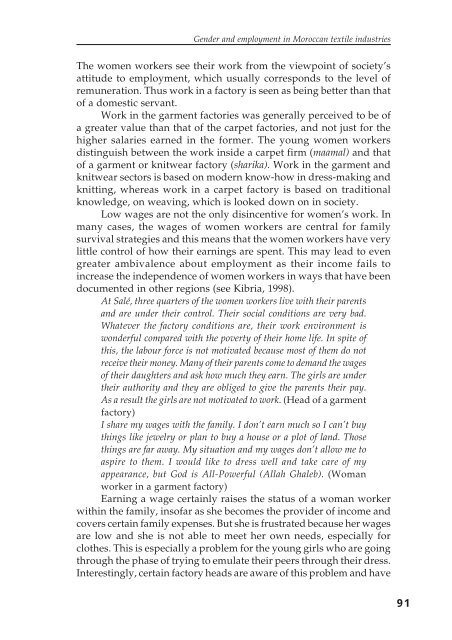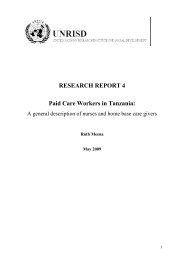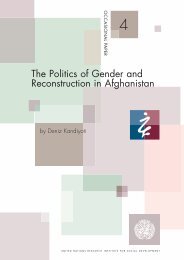Women's Employment - United Nations Research Institute for Social ...
Women's Employment - United Nations Research Institute for Social ...
Women's Employment - United Nations Research Institute for Social ...
Create successful ePaper yourself
Turn your PDF publications into a flip-book with our unique Google optimized e-Paper software.
Gender and employment in Moroccan textile industries<br />
The women workers see their work from the viewpoint of society’s<br />
attitude to employment, which usually corresponds to the level of<br />
remuneration. Thus work in a factory is seen as being better than that<br />
of a domestic servant.<br />
Work in the garment factories was generally perceived to be of<br />
a greater value than that of the carpet factories, and not just <strong>for</strong> the<br />
higher salaries earned in the <strong>for</strong>mer. The young women workers<br />
distinguish between the work inside a carpet firm (maamal) and that<br />
of a garment or knitwear factory (sharika). Work in the garment and<br />
knitwear sectors is based on modern know-how in dress-making and<br />
knitting, whereas work in a carpet factory is based on traditional<br />
knowledge, on weaving, which is looked down on in society.<br />
Low wages are not the only disincentive <strong>for</strong> women’s work. In<br />
many cases, the wages of women workers are central <strong>for</strong> family<br />
survival strategies and this means that the women workers have very<br />
little control of how their earnings are spent. This may lead to even<br />
greater ambivalence about employment as their income fails to<br />
increase the independence of women workers in ways that have been<br />
documented in other regions (see Kibria, 1998).<br />
At Salé, three quarters of the women workers live with their parents<br />
and are under their control. Their social conditions are very bad.<br />
Whatever the factory conditions are, their work environment is<br />
wonderful compared with the poverty of their home life. In spite of<br />
this, the labour <strong>for</strong>ce is not motivated because most of them do not<br />
receive their money. Many of their parents come to demand the wages<br />
of their daughters and ask how much they earn. The girls are under<br />
their authority and they are obliged to give the parents their pay.<br />
As a result the girls are not motivated to work. (Head of a garment<br />
factory)<br />
I share my wages with the family. I don’t earn much so I can’t buy<br />
things like jewelry or plan to buy a house or a plot of land. Those<br />
things are far away. My situation and my wages don’t allow me to<br />
aspire to them. I would like to dress well and take care of my<br />
appearance, but God is All-Powerful (Allah Ghaleb). (Woman<br />
worker in a garment factory)<br />
Earning a wage certainly raises the status of a woman worker<br />
within the family, insofar as she becomes the provider of income and<br />
covers certain family expenses. But she is frustrated because her wages<br />
are low and she is not able to meet her own needs, especially <strong>for</strong><br />
clothes. This is especially a problem <strong>for</strong> the young girls who are going<br />
through the phase of trying to emulate their peers through their dress.<br />
Interestingly, certain factory heads are aware of this problem and have<br />
91
















